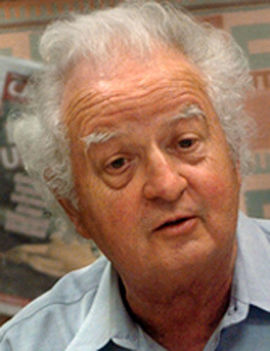WRITING ABOUT JOHN
Citizens Lawmaker by David Schmidt
Arizona acquired statewide initiative referendum, and recall rights at the time of statehood in 1912 equity mentions
“Hon. A. C. Baker of phoenix” as a leader of the local direct democracy movement.
The first Initiative was for women's suffrage, and it passed by a margin of greater than two to one on 5 November 1912.
Two years later, in 1914, a total of 15 initiatives qualified for the Arizona ballot –
a record for initiative use in that state which still stands.
Organized labor that year was successful in passing four initiatives: one to prohibit blacklisting of union members;
a second establishing an “old age and mothers pension”; a third establishing a state government contract system,
printing plant, and banking system; and a fourth requiring that businesses limit employment of non-citizens.
Voters passed a fifth initiative barring the governor and legislature from amending or repealing initiatives.
The legislature responded with a constitutional amendment to make it harder to pass initiatives. This amendment,
however, Could only take effect only if approved by voters. The Arizona Federation of Labor waged a campaign against
the measure, and voters defeated it by a narrow margin in 1916.
Arizona government (1918 and 1982), changes in the court system (19 60 and 1974), and the innovative, highly successful
voter registration system known as “Motor Voter” (1982), which allows applicants for driver's license renewal to
simultaneously register to vote.
Arizonans owe many of their reforms to John Kromko. Kromko, like most Arizonans, is not native; he was born near Erie,
Pennsylvania, In 1940 and moved to Tucson in the mid-1960s. He was active in the protests against the Vietnam War, and
in the 1970s and 1980s has been elected to the lower house of the state legislature several times. By night, he is a
computer programming instructor; by day, he is Arizona's “Mr. Initiative.”
Kromkos first petition was a referendum drive to stop Tucson city council ordinance banning topless dancing.
(He explains with a touch of embarrassment that he was fighting for the principle of free speech.) in 1976 Kromko was
among the handful of Arizonans who, in cooperation with the people's lobby Western Bloc campaign, succeeded in putting
on the state ballot an initiative to phase out nuclear power. The initiative lost at the polls, but Kromko’s leadership
on the issue got him elected to his first term in the legislature.
Once elected, he set his sights on abolishing the sales tax on food, a “regressive” tax that hits the poor hardest.
Unsuccessful in the legislature, Kromko launched a statewide initiative petition and got enough signatures to put food
tax repeal on the ballot. The legislature, faced with the initiative, acted to repeal the tax.
After the food tax victory, Kromko turned to voter registration reform. Again, the legislature was unresponsive, so he
launched an initiative petition. He narrowly missed getting enough signatures in 1980, and he failed to win re-election
that year. Undaunted, he revived the voter registration campaign and turned to yet another cause: medicaid funding.
Arizona in 1981 was the only state without medicaid, since the legislature had refused to appropriate money for the
state's share of this federal program.
In 1982, with an initiative petition drive under way and headed for success, the legislature got the message and
established a medicaid program. Kromko and his allies on this issue, the states churches, were satisfied and dropped
their petition drive. The voter registration initiative, now under leadership of Les Miller, a Phoenix attorney, and
the state Democratic Party, gained ballot placement and voter approval. In the ensuing four years, this “Motor Voter”
initiative increased by over 10 percent the proportion of Arizona's eligible population who were registered.
Kromko, re-elected to the legislature in 1982, took up his petitions again in 1983 to prevent construction of a freeway
in Tucson that would have smashed through several residential neighborhoods. The initiative was merely to make freeway
plans subject to voter approval, but Tucson officials, seeing the campaign as the death kneel for their freeway plans,
blocked ballot placement through various legal technicalities. Kromko and the neighborhood activists fighting to save
their homes refused to admit defeat. They began a new petition drive in 1984, qualified their measure for the ballot,
and won voter approval for it in November 1985.
Arizona's monied interests poured funds into a campaign to unseat Kromko in 1986. Kromko not only survived but fought
back by supporting a statewide initiative to limit campaign contributions, sponsored by his colleague in the legislature,
Democratic State Rep. Reid Ewing of Tucson. Voters passed the measure by a two to one margin.
Kromkos initiative exploits have made him the most effective democratic political figure, besides former governor Bruce
Babbitt, in this perennially Republican-dominated state. And Babbitt owes partial credit for one of his biggest
successes-enactment of restrictions on the toxic chemical pollution of drinking water – to Kromko. Early in 1986 Kromko
helped organize an environmentalist petition drive for an anti-toxic initiative, while Babbitt negotiated with the
legislature for passage of a similar bill. When initiative backers had enough signatures to put their measures on the
ballot, the legislature bowed to the pressure and passed Babbitt's bill.
